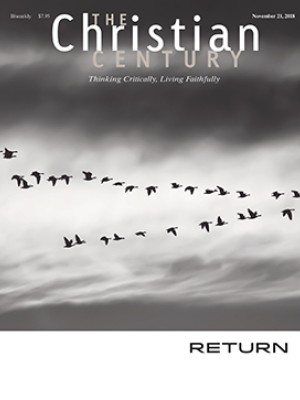How my daughter’s speech delay has changed my preaching
I want others to know the power of the gospel the same way she does.

It’s your usual during-church craziness: my three-year-old daughter drawing and making train sounds with her Thomas toy, the baby crawling up and down the pews, both children stealing toys from each other, and all the while I’m making feeble attempts to worship.
On top of that, as my husband led worship, our daughter was saying over and over again, “Up,” ”Daddy,” and “Peace.” Her speech is delayed, and many weeks she’ll have a new word after weeks of repeating sounds and phrases. She also likes to say her letters and will ask me to write the letters she can say. From our pew you can hear “O,” “P,” and “B.” Her speech delay also means she has no volume control.
Read our latest issue or browse back issues.
Often I’m anxious and self-conscious about the attempts she makes to talk. I worry about the disruption we cause in church, thinking that the pastor’s child—of all children—should be able to sit quietly in church.
On this particular Sunday, as she repeated her words and sounds, the church member sitting in front of us turned around. Then she said, “I love hearing Charlotte saying new words that I can understand.”
In many ways my daughter looks and acts like a typical preschooler. She loves playing at the park, she cheers in delight watching tractors and trains pass, she reads books, she melts down, she loves her baby brother, and she has strong opinions about which clothes she’ll wear for the day. In church she bounces up and down with the music, runs up to greet her friends during the children’s message, puts her dollar in the offering plate, and snacks on cookies and donuts.
Yet one thing sets her apart from other children her age: something known as childhood apraxia of speech. Her brain has difficulty connecting with her mouth. She knows what she wants to say, but getting the words and sounds out is difficult. Thanks to speech therapy, she’s learning how to shape her mouth to form sounds, she’s strengthening her tongue muscles, and she’s finally speaking words. One sound at a time.
It takes weeks of work and repeating for Charlotte to speak a new word clearly and easily. I believe that’s an important reminder as a preacher—that we need to clearly share God’s story over and over again for people to really believe it for themselves and in turn to be able to share it with others.
I’ve also taken cues from my daughter for how I can preach with fewer words. My daughter has a shortage of words, but she doesn’t have a shortage of love, excitement, and joy which she freely shares with others. With very few words, the joy she exudes is palpable.
When I preach, I want others to know the truth and power of the gospel in that way. Through a smile I can convey that the gospel has taken a hold of me. My energy can invite the hearer to know the Good News is for them. By learning a few words of sign language, we can all learn varied ways to tell the story of God’s love. In shortening words, as we do with Charlotte, we can simply yet powerfully tell God’s story.
At a gathering I lead for the youngest in our congregation, one time we were singing “Jesus Loves Me.” My daughter can’t sing the words, but she smiles and sways a bit to the singing. And then she realizes what song it is that we’re singing. She gets excited and runs to the books I’ve brought from home, the ones we read at night. She searches for the book she’s looking for as the rest of us continue singing. Beaming with pride, she brings the book to me and shows everyone. It’s Jesus Loves Me.
My daughter couldn’t sing but she could participate. She could listen. She could dance. She could smile. She could show her understanding by bringing the book to us and opening its pages to the words that declared Jesus’ love for her. She could trust the truth of the song: that she is a beloved child of God.
A version of this article appears in the print edition under the title “Beyond words.”






